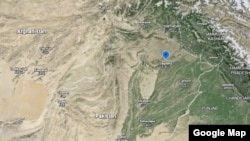Police in central Pakistan said Saturday that hundreds of Muslims violently attacked a minority Christian settlement over blasphemy allegations, resulting in injuries to several people.
The mob attack occurred in the city of Sargodha in the Punjab province, the country’s most populous.
Witnesses and minority rights leaders said protesters ransacked and burned down the house, as well as a small shoemaking factory of a 70-year-old Christian man they accused of desecrating Islam’s holy book, the Quran. He was severely beaten and injured in the process, his relatives reported.
A police statement said their forces promptly responded to the crisis and rescued at least 10 Christians and brought them to safety before dispersing the crowd. Several of those rescued suffered injuries and were undergoing treatment in a local hospital.
The police statement noted that clashes with angry protesters also left 10 security personnel injured. It added that deploying hundreds of additional units in and around the Christian settlement helped defuse the religious tensions.
Senior provincial police officers have reported the detention of up to 20 suspects in connection with the mob attack, promising more arrests in the ongoing crackdown. They said that an investigation into the blasphemy allegations was underway.
Violent mob attacks against religious minorities in majority-Muslim Pakistan are not uncommon.
In August 2023, thousands of people in the Jaranwala district of Punjab attacked and burned 21 churches and damaged more than 90 Christian properties after accusing two Christian brothers of blasphemy. Several Christian families fled their homes because of the violence. Police arrested more than 250 persons, including the three Christians accused of desecrating a Quran.
Blasphemy is a highly sensitive issue in Pakistan, and mere allegations have led to mobs lynching dozens of suspects — even some in police custody. Insulting the Quran or Islamic beliefs is punishable by death under the country's blasphemy laws, though no one has ever been executed.
Critics have long called for reforming the blasphemy laws, saying they are often misused to settle personal scores. Hundreds of suspects, mostly Muslims, are languishing in jails in Pakistan because external pressures deter judges from moving their trials forward.
"While the majority of those imprisoned for blasphemy were Muslim, religious minorities were disproportionately affected,” the U.S. State Department noted in its annual report on human rights practices in Pakistan.
"Lower courts often failed to adhere to basic evidentiary standards in blasphemy cases, which civil society groups and lawyers ascribed to fear of retaliation from religious groups if they acquitted blasphemy defendants, and most convicted persons spent years in jail before higher courts eventually overturned their convictions or ordered their release,” the report noted.
ISLAMABAD —




